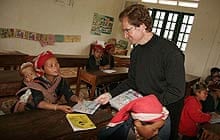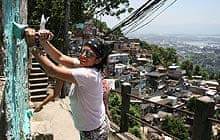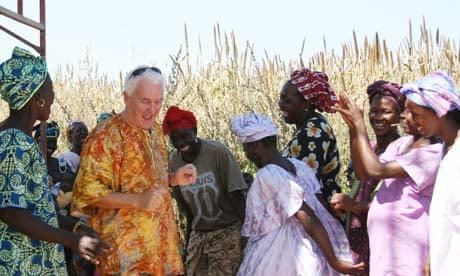The idea was some winter sunshine: two weeks in an exclusive £220-a-night resort in Gambia. A little light sunbathing. Nothing more strenuous than listening to the fish jumping outside the window of their state-of-the art lodge, which floated on the Mandina Bolong river and had five dedicated members of staff on hand to meet their every need, even a canoeist to row them over to the restaurant.
Almost three years on, Brian Harrold, 61, and his partner Pamela Morgan, 55, have returned to Gambia six times, spending £120,000 of their own money along the way. Not to stay at the eco-lodge, as sumptuous as it was, but because, a few miles from their hotel, on their first trip, they came across what might be called the 'real' Gambia.
They were half way through a walking safari with their hotel guide, Lamin, when Pamela noticed a wisp of smoke in the distance.
'What happens over there?' she asked. (I have the impression Pamela asks this kind of question quite a bit.)
'You can't go there,' said the guide.
'That's where we want to go,' said Brian. (I have the impression Brian doesn't often take no for an answer either).
They made a pact. If Brian and Pamela didn't tell his boss, Lamin would take them to the village that was the source of the smoke.
Most tourists in Gambia never see the local villages. Even the journey from the airport to the main tourist beaches has been sanitised for the sake of the country's ever more lucrative tourist industry. Transfer coaches hum along a new dual carriageway, lined with flags.
What visitors rarely discover is that on the Economic Development Index Gambia is at number 192 out of 208 countries. Life expectancy is 56 years; infant mortality rate is 112 out of 1,000 (compared with six out of 1,000 in the European Union). Lack of clean water is one of the major causes of infant deaths.
If we're honest, most of us who have ever been on a luxury holiday to a developing country make a deal with ourselves. We become, temporarily, severely myopic. Lying on a beach, or lazing by the pool, we know we're a cocktail coaster away from abject poverty but we edit out the reality. And why not? We tell ourselves. We're on holiday. We deserve it. What can we do about it anyway?
Brian and Pamela were seasoned travellers. After careers building up separate, highly profitable businesses in manufacturing and the motor trade, they were enjoying their early retirements, comfortable in the knowledge that there was enough money in the bank. As well as lots of golf (they'd met five years ago on a golf course), they'd trekked in the Himalayas, done charity work in Thailand. However, nothing prepared them for the village of Bafaluto.
'Houses made from mud, holes for windows and doors,' remembers Pamela. 'Two or three families in each house. Really clean but absolutely nothing inside them: no chairs, no tables, no beds. Just what looked like an empty duvet cover to sleep on.' Brian adds: 'No sewage system, no electricity, no clean water, nothing.'
Nevertheless, the villagers were friendly, if surprised, to meet this couple from County Antrim. Two bottles of very warm Fanta were rustled up by way of refreshment.
That evening, sitting down to a delicious dinner back at the hotel, the couple were uncharacteristically quiet with one another.
'Well, what are we going to do about it?' said Pamela.
'About what?' said Brian.
'You know bloody well about what,' she said.
'We'll go back tomorrow and have another look.'
The following day they went with a retired headmaster, Momodou Joof, to see the village chief. 'We would like to do something for you,' they told him. 'It was as vague as that,' recalls Pamela. 'In my mind I was probably thinking five grand or something.'
The chief's reaction was lukewarm. 'They never expected to see us again,' says Brian.
Two months later, Pamela and Brian were back in Bafaluto, sitting under a large mango tree with Momodou, several government officials, and 120 representatives of the 600 villagers, a mixture of men and women (Pamela's only stipulation was that the women should have their say.)
On the ground, in the red dust, they traced a map of the village. Next they debated what they needed. A grid was drawn: six squares, six options. A clinic, a school, electricity, a clean water supply, a road and a vegetable garden. Each villager was given a white stone with which to cast their vote.
'The decision was debated and made exactly as it would have been in a boardroom, except it happened on the ground,' says Brian. A clean water supply and a vegetable garden were the unanimous choices. Momodou, whom the couple had grown to trust, was asked to go away and get the price.
An easily available, clean water supply had the potential to save lives and transform village routine, particularly for the women. Each day they would fetch water from the well. Each bucketful had to be boiled, which meant finding wood too. It was arduous work. In the rainy season, from June to October, it was even worse.
The couple gave Momodou a laptop and a digital camera which meant they could monitor progress by way of daily emails and picture updates. By November 2007, with the help of a hydrologist, a six-inch borehole had been dug, 80 metres deep; solar panels installed for the electricity to pump the water into a storage tank from which it could feed taps throughout the village.
They were just weeks away from fresh clean water. In the meantime, three acres had been cleared and six irrigation wells hand dug which meant they could grow fruit and vegetables to harvest four times a year. A fence was built to keep out animals. Now they had a way of earning money which would pay for the upkeep of the pump.
I wonder what it is about this pragmatic, rather self-effacing couple that has made them give up hundreds of hours, not to mention a hefty chunk of their savings.
True - they're more financially secure than most people. But not many retired entrepreneurs would bother with this kind of unglamorous and ambitious charity work. At one point they even drove to Gambia from Spain, through Mauritania and Senegal, in their 4X4: 5,000km with the boot packed with sanitary towels and seeds for the villagers.
'You can only play so much golf,' says Brian. 'Apart from raising a family, this is by far the most worthwhile thing I have ever done.' He thinks about the many young Gambian men who risk their lives to reach what they hope might be new opportunities in Spain. 'Instead of spending millions building big fences along the north of Morocco, if we fed the money into the villages they wouldn't want to leave. We've spoken to migrant workers - every one of them would rather be back home with their family.'
Now they've set up a charity, Ping, (People In Need in Gambia) and are working with another village, Njongon, which is on the North Bank, a remote and even more impoverished part of Gambia.
Nine other villages have come forward saying they need help. People are moving to Bafaluto because they can see how the village's fortunes have improved since getting the water supply. The success convinces Brian and Pamela that the work is a comparatively cheap, quick and effective way to transform people's lives but now they need outside donations, perhaps, even, a major sponsor. They want to raise £1m.
'We've proved that our money could do what we wanted it to do,' says Pamela. 'It was value for money when you think of the number of lives it has helped. What we need now is outside financial assistance. If people will donate, we will be as careful with their money as we were with our own.
'We didn't go on holiday to say: let's find a mission. But when we walked out of the hotel and went to where the Gambian people were we found there was a whole different world out there. We couldn't ignore them.'
To find out more and to make a donation visit pingcharity.co.uk
Volunteering holidays

'I was working in the city and at a bit of a crossroads'
Christopher Hill, founder Hands Up Holidays
'Before I set up Hands Up Holidays I was working in the City in banking and head hunting. I was at a bit of a crossroads. I'd learnt some good business skills but was a bit disillusioned and looking for something else. Two travel experiences in 2002 led me to change direction. First I went to Guatemala to learn Spanish and ended up teaching the family English, before travelling round the country.
'Then I went to South Africa and a friend who is a tour guide put me in touch with a house-building association and I helped with building work in a township outside of Cape Town, before exploring southern Africa. I loved the combination of cultural immersion with giving something back and the adventure of travelling. Slowly the idea for Hands Up Holidays began to form. I went back to the City until the end of the year, then took time out to study and work on my business plan.
'My very first itinerary, prepared by my friend the tour guide, was in South Africa. I was close to launching when someone in the travel industry told me I should wait until I had more destinations to gain more credibility, so I ended up travelling a lot and building up relationships with volunteer projects and local tour operators. When we launched in 2006 we offered about 20 destinations. The idea is that a Hands Up Holiday is a starting point for people to dip their toes into volunteering, then hopefully go on to do something more substantial.
'We also encourage people to volunteer back at home in their own communities, and become advocates or on-going sponsors for projects they've worked on. Projects range from being a reading partner in schools in countries where they speak English such as South Africa, to repair and renovation work or environmental conservation.
'It's very rewarding for our clients, as well as the communities they're helping. There's no comparison to what I was doing before; setting up Hands Up Holidays satisfied my passion for travel and desire to make a difference and I wouldn't go back.'
Hands Up Holidays (0800 783 3554; handsupholidays.com)
School exchange programme
'Ghana was a real eye-opener for our pupils'
Deborah Sharman, head of food and nutrition, West Buckland School, Barnstaple, Devon
'I went to Ghana with Explore on a two-week tour in December 2004 and loved the country. I didn't know anything about it before I went, I ended up there by default really (Thailand was where I'd planned to go) but it was such a fascinating experience, the people were so lovely and there was a real buzz about it.
'When I found out that the tour guide's brother was a teacher, too, I started to think about how we might be able to work together. I work in a small private school in north Devon and the children aren't exposed much to other cultures so I thought it would be a great opportunity for them to learn about other children's lives in Ghana.
'I applied for funding from the British Council and received a Reciprocal Visit Grant, which meant myself and a colleague were able to visit the school to set up the project and two teachers from Ghana were able to come to us.
'It was eye-opening. The school is in a village called Boanim in the Ashanti region. It's very basic with open-sided classrooms, and the primary school just has corrugated tin roof huts with dirt floors. We brought as much educational equipment with us as we could and we were welcomed with a ceremonial pageant by the chief and the elders.
'We started a correspondence programme between the pupils, and began fundraising for more books, educational games and stationery to take out. Last year, we took four girls from the sixth form to visit the school, staying in the family compound of one of the teachers. It was an incredible experience for the girls - they were shocked by the poverty and learnt a lot. It was wonderful to see how much they got out of it and the relationships they formed with the Ghanaian children.
'We're now hoping to raise more funds to continue the project. It's been so interesting and rewarding; we want to plant 150 teak trees there to mark our school's 150th anniversary this year too.'
Favela project in Rio

'People can really make a difference'
Kate Nowakowski, co-founder Jingando Holidays
'It all started when I was travelling in Brazil. I met Teresa who was volunteering there, we were both looking to leave what we'd been doing in the UK (I was in media and she was a manager at Centrica) - and both wanted to learn to dance samba. Slowly an idea started to form.
'People feel daunted by Rio and it's hard to get beyond the usual tourist traps. We built up relationships with locals and really got to know the city and felt we could offer an insider's guide and unique holiday experiences. We got involved with community work in the favelas (slums), painting people's houses, and found that visitors were really interested in joining in. So we started Jingando Holidays, which offers holidays in Rio combining dancing and community work and the chance to see Brazil from a local's point of view. The people are poor financially but culturally rich, it's good to give something back and people really do make a difference, even doing something in an afternoon or a day can have an impact.
'We're involved with the Julio Otoni favela project helping fund a community centre and out-of-school activities to keep kids off the streets. We're also developing a footwear brand, Jingando shoes, bringing fashion and ethics together and making sure the money comes back to the locals. It's all been a fantastic experience - it's important to do something for reasons that aren't about making money and are environmentally and socially positive.'

Comments (…)
Sign in or create your Guardian account to join the discussion